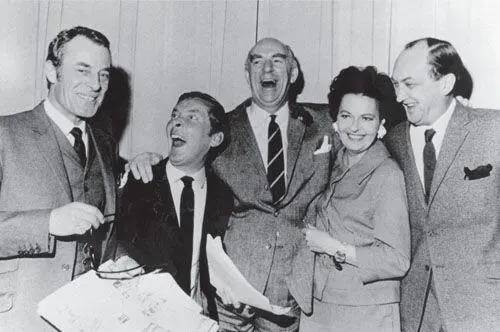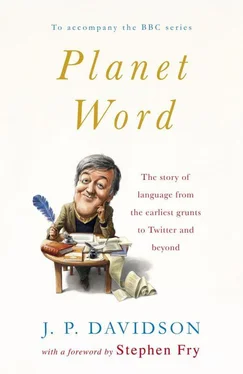Gay journalist Peter Burton included an example of Polari in his autoboigraphy Parallel Lives .
As feely ommes … we would zhoosh our riah, powder our eeks, climb into our bona new drag, don our batts and troll off to some bona bijou bar. In the bar we would stand around with our sisters, vada the bona cartes on the butch omme ajax who, if we fluttered our ogle riahs at him sweetly, might just troll over to offer a light for the unlit vogue clenched between our teeth.
(As young men … we would style our hair, powder our faces, climb into our fabulous new clothes, don our shoes and wander/walk off to some fabulous little bar. In the bar we would stand around with our gay companions, look at the fabulous genitals on the butch man near by who, if we fluttered our eyelashes at him sweetly, might just wander/walk over to offer a light for the unlit cigarette clenched between our teeth.)
The origins of Polari are unclear. It’s a linguistic mongrel, borrowing words from Occitan, Romany, Shelta (the cant of the Irish tinkers), Yiddish, back-slang and rhyming slang — all interspersed with words of Italian origin. One theory is that Polari — from the Italian parlare , to talk — was the lingua franca of seafarers and traders around the Mediterranean ports in the Middle Ages. It made its way to Britain via travelling circuses and fairgrounds and was used widely on board British Merchant Navy ships.
Between the 1930s and 1970s, Polari was used in theatres and private gay drinking clubs, especially in London. In 1965, Polari came to the attention of a much wider audience with the arrival of a new BBC radio comedy programme, Round the Horne . More than 9 million people tuned in every Sunday afternoon to listen to the sketches, one of which featured two camp out-of work actors called Julian and Sandy, played by Hugh Paddick and Kenneth Williams. Their torrent of double entendre and innuendo included Polari terms which would have sounded like gibberish to most people but which regular listeners learned to decipher. The host, Kenneth Horne, would visit a new enterprise each week — Bona Pets or Bona Ballet or Bona Books or something — and enter saying, ‘Hello, is there anybody here?’ He’d be greeted by the camp duo. ‘Hello, I’m Julian, and this is my friend Sandy.’ ‘Oh, Mr Horne, how bona [good] to vada [see] your dolly [pretty] old eek [face].’
In the sketch ‘Bona Law’, Barry Took and Marty Feldman included the line: ‘Omes and palones of the jury, vada well at the eek of the poor ome who stands before you, his lallies trembling’ (‘Men and women of the jury, look well at the face of the poor man who stands before you, his legs trembling’). Barry Took explained later that he had learned some of the Polari words during his time as a music-hall comic in the West End. He said Kenneth Williams and Hugh Paddick were always speaking Polari to one another and would sometimes adlib the sketches to include more Polari.
Some of the material was really quite risqué. In one episode Sandy refers to Julian’s skill at the piano as ‘a miracle of dexterity at the cottage upright’. Only the Polari cognoscenti were likely to have known that a cottage was the term for a public toilet where men met for sex and upright meant an erection.
By the end of the 1960s, Polari was in decline — partly as a result of the decriminalization of homosexuality and the advent of gay liberation and in part, no doubt, to the success of Round the Horne . The secret language was no longer secret. Indeed, some Polari and words have entered into mainstream language: butch, naff, queen, mince, camp, drag, fab, dishy, butch, bijou, savvy, scarper, tat and bevvy .
Polari may not be used as a secret language by the gay community any more but it is seen as playing an important part in gay cultural history. The Sisters of Perpetual Indulgence, an order of gay and lesbian nuns and monks, translated the King James Bible into Polari in 2003 and posted it on the internet.
In the beginning Gloria created the heaven and the earth.
And the earth was nanti form, and void; and munge was upon the eke of the deep. And the fairy of Gloria trolled upon the eke of the aquas.
And Gloria cackled, Let there be sparkle: and there was sparkle
And Gloria vardad the sparkle, that it was bona: and Gloria medzered the sparkle from the munge.

Round the Horne , full of risqué Polari and double entendre
It’s impossible to write about the uses and abuses of language without mentioning Australia — for it is here we find some of the most playful, colourful, sometimes vulgar uses of the English language. If Shakespeare walked this earth today, he’d feel a lot more at home in Streaky Bay, South Australia, than Stratford-upon-Avon. From budgie smugglers (brief swimming trunks) to liquid laughs (vomit), the Australians do seem to have an awful lot of fun with their words.
When the first Europeans set foot on the island, there were perhaps 300 native Aboriginal languages. Today, that stands at around seventy, and most of them are endangered. English is the dominant language, spoken by 99.8 per cent of the population. From the moment in 1770 when Captain Cook and his botanist Sir Joseph Banks asked the local Aborigines for the name of that strange hopping animal, the Australian language has been lending, borrowing, developing and inventing words. The animal was noted down as ‘ gangurru ’; the myth that the gangurru reply in fact meant ‘I don’t understand you’ has, alas, been debunked. The locals were simply describing a particular species of kangaroo.
Captain Cook claimed Australia for the British Crown and almost immediately this outpost on the other side of the world was turned into a penal colony. Around 160,000 male and female convicts from England and Ireland were shipped to Australia between 1788 and 1868 (when transportation ended); their numbers were swelled by the wool and gold rushes of the 1850s.
Author Kathy Lette grew up a surfer girl in Sydney but moved to London in her twenties. She points out that the Australians have spent years suffering the jibes of being a nation of convicts.
‘A lot of English people see Australians as a recessive gene, sort of the Irish of the Pacific. They can’t believe that they sent all the convicts out to the sun while they stayed there in the rain. My grandmother told me something fantastic when I was leaving for England, because sometimes the English can have a condescension chromosome about Australians. She said to me, “Ah Kath, you can’t possibly go and live in London, that’s where all those terrible convicts come from.” ’
Soon after the arrival of the first immigrants, a distinct accent began to emerge. One theory about the lack of lip movement in Aussie-speak is that the European arrivistes had to learn to open their mouths as little as possible when they talked to keep the flies out.
Observers described the language of the early nineteenth century as being heavily influenced by the rhyming slang of the Cockney London convicts. In 1827 Peter Cunningham, a Scottish convict ship surgeon, reported in his book Two Years in New South Wales that the native white Australians spoke with a distinctive accent and vocabulary: ‘This is accounted for by the number of individuals from London and its vicinity … that have become residents in the colony and thus stamped the language of the rising generation with their unenviable peculiarity.’
Читать дальше













